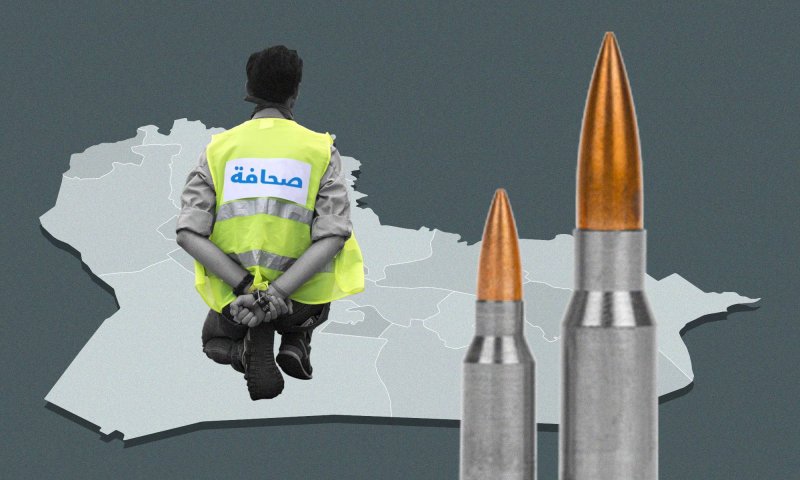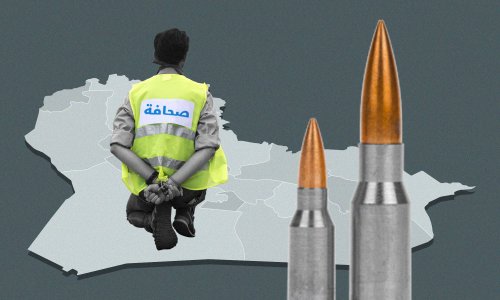Like many states around the world, journalists in Arab countries are subject to various threats and assaults, including beating, imprisonment and arbitrary detention – the price paid for their criticism of the ruling authority or one of its symbols. In Iraq, the problem has been exacerbated to such an extent that the country has become one of the most dangerous places around the world for journalists, with a rise in assaults targeting them as they go about with their professional duties.
In the 2019 report on press freedom compiled by Reporters Without Borders, Iraq was ranked as 156th out of 180 states: a fall of six places from its 2013 ranking (150).
The low ranking of Iraq's press and media freedom, in addition to its continued regression is a dangerous indicator of the risks taken by journalists in the country. Despite the fact that freedom of expression was guaranteed by Article 38 of the 2005 Iraqi constitution – encompassing freedom of the press, print, public announcements and publishing, so long as it does not impair public order and ethics – in Iraq's current reality this provision ultimately seems reduced to "ink on paper."
Indeed, the country's judicial authorities continue to operate on the basis of the modified Iraqi Penal Code (no.111) of the year 1969, which creates the space for the curtailment and constraining of these freedoms at any time – with article 85 of the aforementioned law stipulating a punishment ranging from detention in a 'rehabilitation school' to execution for all those who impugn the state through publication and public announcements.
Khomeini: a Red Line
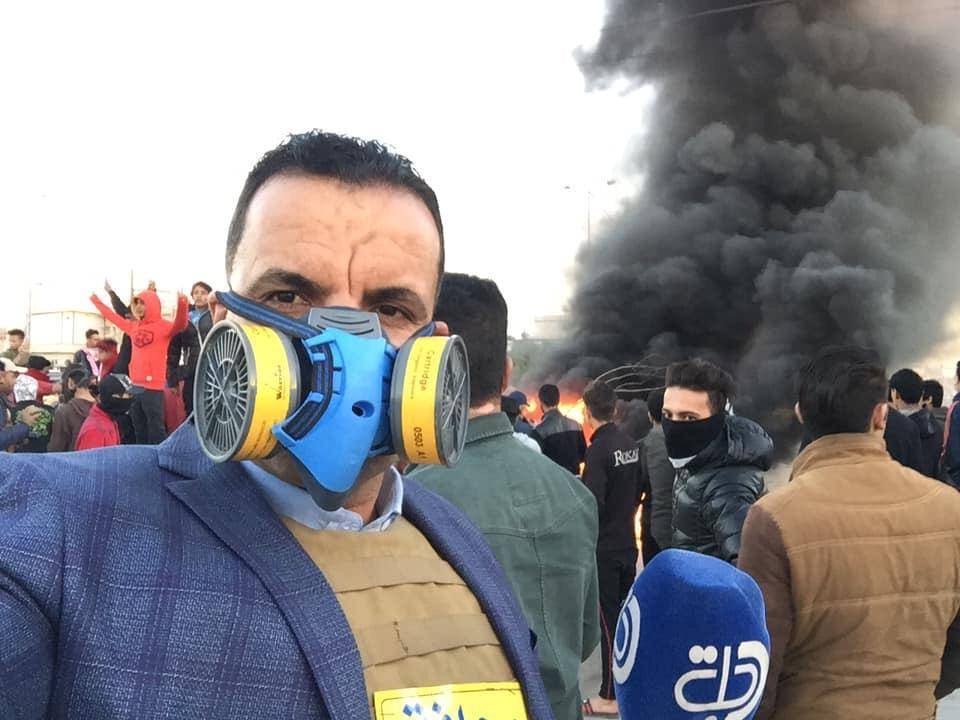
In Iraq's southern province of Basra, journalist Ahmed Abd al-Samad began his work in journalism in the year 2004, for the Baghdad newspaper "All Iraq." He would soon ascend the ranks to become a manager and reporter for the "Tigris" satellite television channel.
Yet the year 2016 would hide an unpleasant surprise for Abd al-Samad. He tells Raseef22: "I was subject to threats of physical liquidation from militias, after I conducted a television report criticizing the naming of a street "Imam al-Khomeini" and the hanging of his pictures in the city center."
Abd al-Samad adds: "As a result of this report, the militias sent me threats through letters placed in front of my house; I also received phone calls threatening my life" Yet the Iraqi journalist adds: "these threats did not shake a hair on my body, and did not stop me from continuing my journalistic work."
The sources of the threats which Abd al-Samad was subjected to multiplied in number. In previous incidents, he was subject to assaults by the security apparatuses in the city because of his criticism of its weakness and lax attitude to dealing with explosions and security incidents – in addition to his reporting on their collaboration with arms and drugs smugglers from countries neighboring Iraq.
Abd al-Samad continues: "I used to just ignore the threats for a simple reason: namely that I undertook this path and I knew its consequences, including the twists and turns, some of which are above board and some of which are veiled and below-surface."
"I was subject to threats of physical liquidation from militias, after I conducted a television report criticising the naming of a street "Imam al-Khomeini" and the hanging of his pictures in the city centre."
31-year old journalist Haydar al-Halfi was arrested in Basra for covering protests in Basra, he paid $840 bail and undertook not to cover any further protests in order to be released.
He continues: "The danger you face increases when you are a real journalist; when you compliment and praise there is no threat towards you – indeed, the compliments and praise may enrich you with large sums of money."
It should be noted here that the commander of military operations in the Basra region, Qassem Nazal, had previously threatened to arrest journalists who covered protests in Iraq's second city – a threat which should be considered a legal violation and an attempt to silence criticisms and constrain the freedom of maneuver of journalists, putting on full display the violations conducted by the security apparatuses under orders from the higher security authorities in the province of Basra.
Supporting Protesters is a Red Line
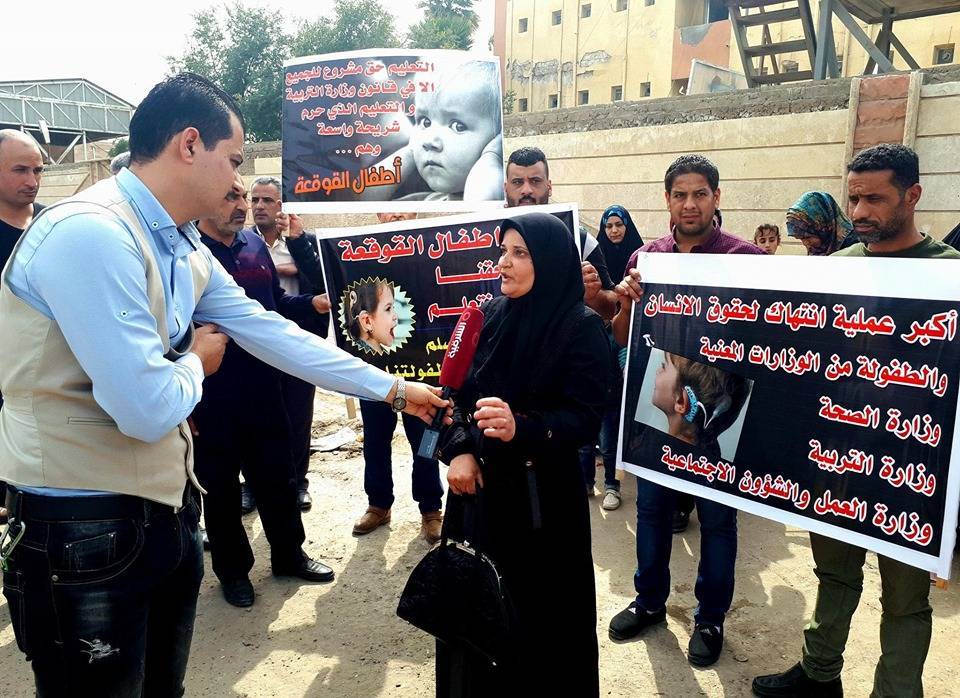
Meanwhile, journalist Sajad Akram Ahmad, a native of the province of Baghdad and a correspondent for Al-Sharqiya TV, endured assaults on three different occasions during the period of his employment. He tells Raseef22 that "the first assault was by the security apparatuses in the year 2018, during my live coverage of protests by citizens in the Baghdad neighborhood of Bab al-Sharqi, in solidarity and support of the protesters of the city of Basra, who were moved to protest by water pollution and the deterioration of services and the security situation."
The second assault on Ahmad took place in Baghdad's International Airport. He recounts: "On my return from covering the Haj pilgrimage – and this is a situation that makes you both laugh and cry at the same time – some Zamzam water [from a well in Mecca which Muslims believe to be holly] was stolen from one of the returning pilgrims inside the airport, and so the pilgrims asked me to film the incident, so I switched on my personal mobile camera, only for airport security to quickly intervene to take my phone and erase the video. This is a situation that I will never forget."
Finally, the Iraqi journalist details the incident of his third assault. He explains that a doctor in the Yarmouk hospital in Baghdad made a mistake during surgery, when he placed a piece of metal in the left leg of a patient instead of his right. "On the behest of the patient's family, I quickly headed to the operations room in the hospital and began filming the [patient's] case using my personal mobile phone; however, the medical cadres in the room assaulted me with insults and broke my mobile phone, before forcing me to erase the video in order to allow me to safely leave the place."
We asked Ahmad if he submitted a complaint to the relevant authorities, only to receive the response: "I am a journalist, I take my rights by myself through journalism, because it is the fourth authority."
Journalists on Death Boats
Journalists in Iraq suffer on a variety of levels, and do not practice their profession in freedom and security. Many would find themselves resorting to the "boats of death" which they once wrote about in order to head to Europe.
One of these journalists is Sindbad Ahmad al-Shabki, who lived in the province of Mosul and worked as a manager of the Al-Fayhaa satellite channel. When Islamic State of Iraq and Syria occupied his city in July 2014, the group raided his office and broke all the filming equipment and other furnishings in the office, threatening al-Shabki with murder if he continued his media work.
Al-Shabki was forced to leave his city and head to the Kurdistan Region of Iraq – specifically to the province of Duhok, along with his wife Zainab Zuhair who used to work with him in the same office.
Subsequently, al-Shabki told Raseef22: "In the province of Duhok, I was subject to harassment by the [Kurdish] Peshmarga forces when I went to write a report on the refugee camps, where they prevented me from filming for reasons that I don't know up this day."
The continuous harassment and threats prompted al-Shabki to decide to migrate to Germany with his wife and three children. His wife Zainab told Raseef22: "We suffered a lot during this journey until we finally arrived safely; [we encountered] moments which resembled death, which I do not want to remember."
Today, al-Shabki works in a factory which publishes newspapers and other publications in Berlin. He says: "There are two reasons that make me continue my journalistic work, the first: that I want to continue the path began my father who worked in journalism before his death, and the second, because of the feeling of patriotic duty towards my country."
Fear of Armed Groups
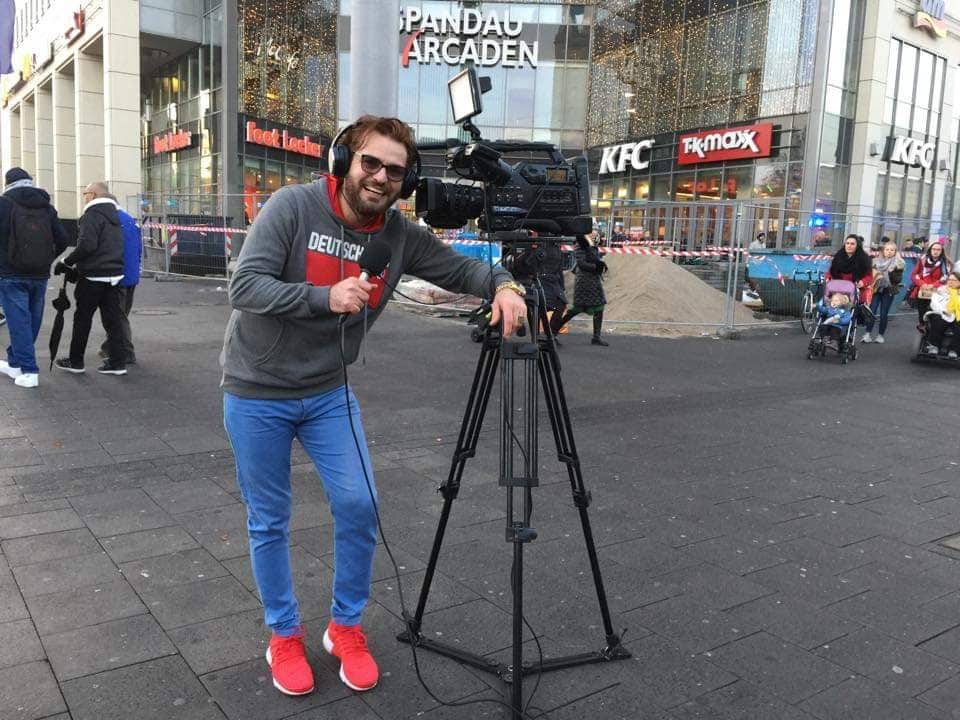
The suffering of al-Shabki and his family was also the fate of 31-year old journalist Haydar al-Halfi, a native of of Basra. Like al-Shabki, he too would arrive in Germany after an exhaustive sea and land journey.
Al-Halfi worked as a reporter for the Al-Baghdadia and Al-Sharqiya television channels. During his coverage of protests in Basra, fueled by poor services and a lack of work opportunities, he was arrested by Iraqi security forces and detained for several hours before his ultimate release.
Al-Halfi tells Raseef22: "I was released after I paid a bail sum of one million Dinars ($840 US Dollars), as well as signing a pledge to no longer cover any future protests; the security forces confiscated my filming equipment which I carried that day."
Al-Halfi adds: "But the strange thing was that even after I was released on bail, police notifications continued to arrive at my home requesting my compulsory attendance."
As with others, this incident was not the only assault suffered by al-Halfi. He had been previously subject to several assaults because of his coverage in television reports of corruption cases in construction and development projects in his city – as well as his reporting on the troubles of the city's residents and their various problems.
Accordingly, al-Halfi received verbal threats both from security officers and sectarian militias. He would depart Iraq in 2015, after the Iraqi judiciary failed to vindicate him after he lodged a complaint at the Basra Court of Appeals.
We asked al-Halfi about the response he received from the judicial authorities, to receive the answer: "The judge told me: I cannot do anything for you." He continues: "I left Iraq after I lost faith in the security apparatuses and judicial authority. They both stole my right."
The Reporters Without Borders (RSF) organization also documented al-Halfi's suffering after his safe arrival in Berlin, where he lives in self-reliance. Al-Halfi was able to continue work in his profession, working as a reporter for various Iraqi and Arab satellite television channels.
As If We Are Commodities
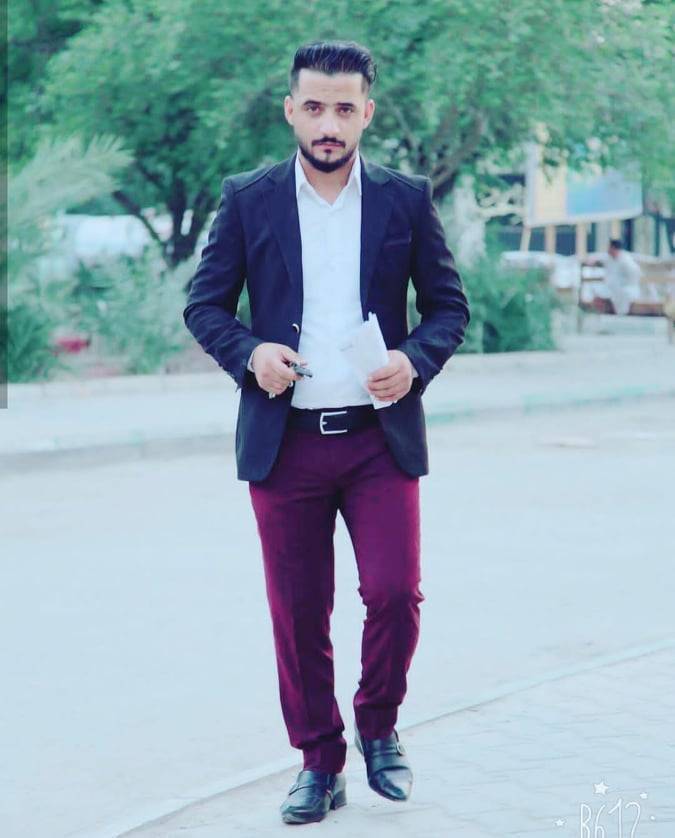
"I remained in Turkey for 45 days amongst the smuggling mafias, I paid $9,000 to a Turkish smuggler who sold us to another, as if we were commodities and not humans" says journalist Hussain al-Khazali who arrived in Sweden after a short journey, only to then return to Iraq despite fully knowing the dangers of such a return, he explained in an interview with Raseef22.
"In the boat that does not exceed a length of eight meters, I still remember the sound of babies crying and the wails of mothers who risked their lives for a safe life. The waves of the sea were harsher to me than the circumstances in my country" he says.
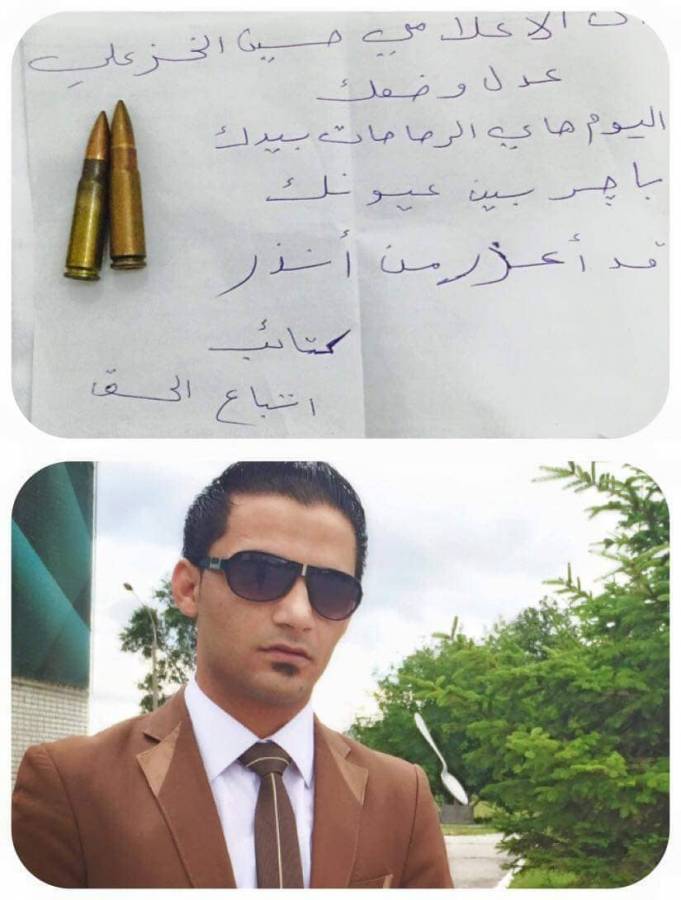
Al-Khazali, who used to live in the southern Iraqi district of Al-Samawa, was subject to threats signed by "The Followers of Truth brigades," which forced him to migrate to Sweden in 2014.
He added "I used to compile television reports that exposed the corruption and implication of state officials and exposed them to public opinion, and this used to anger officials in the province."
Al-Khazali continues: "On one of these days, I went to film the overflow of water in one of the streets of the city as a result of the poor management of services, only to be surprised by a police officer who was awaiting me while carrying his weapon; he was surprised by me carrying a camera, saying in a loud voice: 'Are you carrying a camera? A cameraaa?' – while signaling with his hand that I was prohibited from filming, so I responded: it is just a camera, not an IED [Improvised Explosive Device]."
Al-Khazali continues: "In front of my home, two bullets were left for me inside an envelope, along with a paper on which it was written 'If you do not leave your work in two days your fate will be physical liquidation [elimination].'" This was the last and most dangerous threat received by al-Khazali.
Iraq's local security authorities routinely refuse to make statements on cases of assaults against journalists, but the official spokesman of the Interior Ministry, Major-General Sa'ad Ma'an, told Raseef22: "There is high-level coordination with the Iraqi Journalists Syndicate in order to reduce the assaults that journalists are subjected to, and we are doing everything we can to achieve this."
However, the head of the Iraqi Journalists Rights Defense Association, Ibrahim al-Saraj, disagrees, pointing out that "in nearly every year, between 220 and 280 journalists all over Iraq are subjected to various assaults, including beatings and detention and the confiscation of their journalistic equipment."
He added to Raseef22: "Most of these assaults are by the security apparatuses, police, and groups that protect [public] officials or bodies that are linked to officials in the Iraqi government." He continues: "There is no cooperation from the part of the Iraqi government; even the Culture and Media committee in the Iraqi parliament are neglectful in this; all the governmental bodies did not listen to our demands to stop violence or even open the cases of journalists who were subject to assaults."
Al-Saraj concludes: "Even the legislation of the law for the rights of journalists has not reduced the assaults that journalists have encountered by various official bodies as well as non-official ones."
Raseef22 is a not for profit entity. Our focus is on quality journalism. Every contribution to the NasRaseef membership goes directly towards journalism production. We stand independent, not accepting corporate sponsorships, sponsored content or political funding.
Support our mission to keep Raseef22 available to all readers by clicking here!
Interested in writing with us? Check our pitch process here!
